
| Samuel Korff as Family Man |
 |
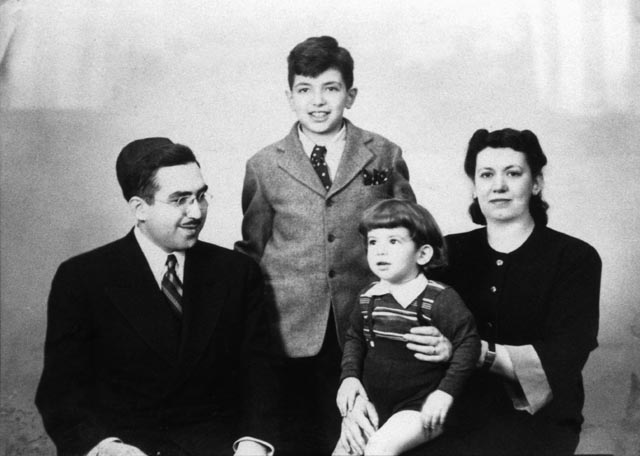 |
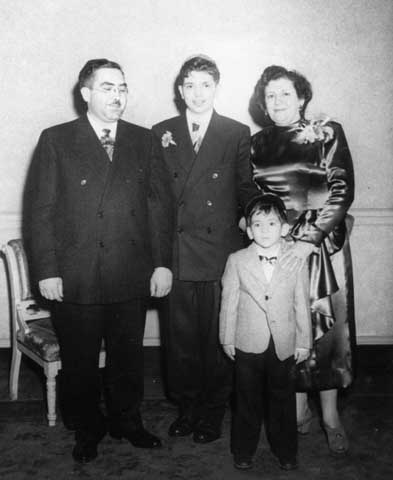 |
|
Samuel and Nesha Korff with their children David (the older child) and Joseph (the younger) |
Joseph Korff provided insight into the private life of Samuel Korff:
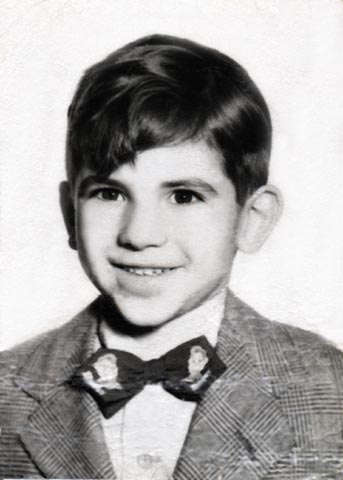 |
|
Joseph Korff |
"My father loved his father and looked up to him. Following in his footsteps was clearly the life my father chose. My father was under a lot of tension. He became emotionally exhausted in the late forties and went down to Florida for a few months to recuperate. I often wondered if my father had been brought up in a different background what he would have done. He was intellectually gifted but not a scholar along the lines of a Soloveitchik. But his focus was not in developing a following like Soloveitchik.[1]
"I saw my father fleetingly. We had dinners together on the holidays and Shabbos but he would go right to sleep after Friday night dinner, exhausted, and he would take a nap on Saturday. We had occasional Sunday trips. From time to time we'd go to New York for a long weekend. Occasionally on a Sunday we would drive to Milton to get an ice cream in the Blue Hills. Despite the fact that we didn't spend all that much time together, I never felt disconnected.
"I couldn't go to movies on Saturday and I was big into movies and television. I felt these strains and I didn't like it, but it didn't matter very much to me. It may have mattered more to my brother.
"When I was growing up I went to Maimonides, a Hebrew Day School. My friends were not necessarily from our Jewish neighborhood. We lived on the border of a blue-collar ethnic neighborhood and I hung out with guys from this ethnic neighborhood at the playground. I played ball and did what kids do at a playground. My brother was into math and into gambling. So I picked up some of this. Once my father came to the playground looking for me right before a Sabbath or a holiday. He caught me playing cards in the open, and he was furious with me. I hid in the bathroom, blockading the door.
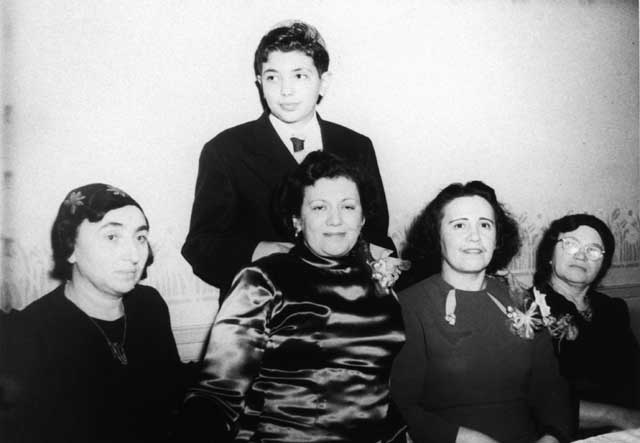 |
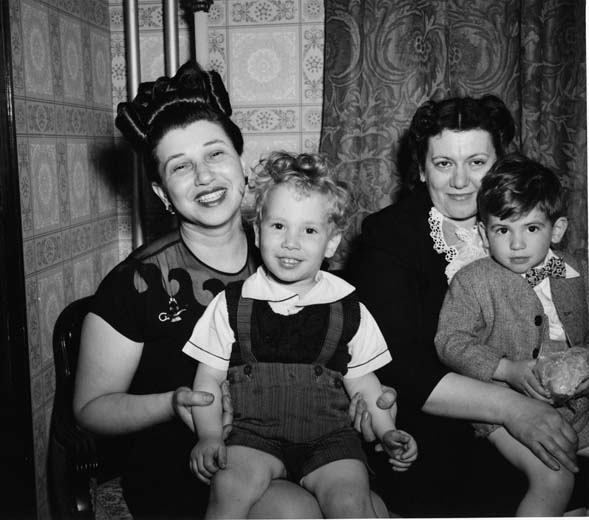 |
|
(above) Joseph Korff standing behind his mother, Nesha (left), Nesha and Joseph Korff (right) with Sam's sister Adele Gass and her son Paul (right)
(below) Samuel Korff, directly to the right of the bride (his sister Betty |
|
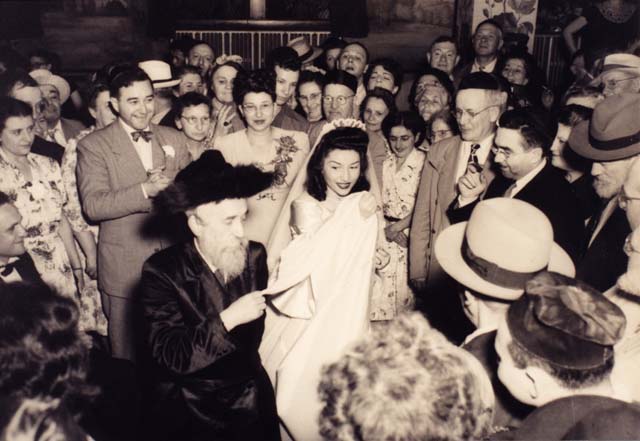 |
"My father tried to be what he understood to be a good father. If I wanted a train set, he bought me a train set. He took me to sporting events but he didn't have a clue as to what was going on. He didn't know when he was supposed to cheer and when he wasn't supposed to cheer. He was in there cheering. I could tell it was an act, but it was fine. He tried to tutor me in my Hebraic studies where I was performing below his expectations. This wasn't always a successful experience because I really didn't want to do it, and he was exhausted from the week's endeavors. It was a strain on him.
"My father was very upset that my brother, the older son, didn't want to follow in his footsteps. There were fights about it in the family. David was extremely bright. He refused to become a rabbi and started screwing up at Harvard. He went through psychological counseling. My father backed off and my brother became a physicist.[2] I never got pressured.
|
|
|
As a young man, David Korff butted heads with his father over career choice. |
"I had great respect and love for my father, but I watched various situations he had to deal with--from the members of the congregation who were a power base in their own right and gave him pain and all sorts of grief to when I registered at Brandeis University and he had to deal with Jews who were anti-religious. When class registration fell on a Saturday or a Jewish holiday, he came with me to try to arrange an alternate approach. There was an anti-religious Jew who was in charge and he gave my father and me a hard time. My father just did the Jewish analogy to the Black "Yes-massuh shuffle," and I was furious. I couldn't go into this rabbinic life if I was going to end up having to bow and scrape from time to time as I felt he had to. He never pushed me to become a rabbi, and I never had any desire to become one.
"In the late 1950s or perhaps early 1960s, my father suffered a stroke at a Friday evening meal. Had I not been there he probably would've died. Somebody had written something accusatory about my uncle, Baruch, in a letter and my father was looking at the letter and talking. He was eating fast which was one of his patterns of behavior. Suddenly, his head just dropped and he collapsed on the table. He had meat stuck in his throat. It was scary. He had an aneurysm that burst. But he recovered.
"My father was called upon to supervise food preparation on the Cunard Lines trips to Israel to celebrate Israel's 25th anniversary in 1972-73. He really got a lot of pleasure out of that but given the threats of bombing there weren't very many people on board. The family went, and I got involved in supervising as well. The ship was escorted out of London Bay by frogmen who checked to see if there were any bombs.
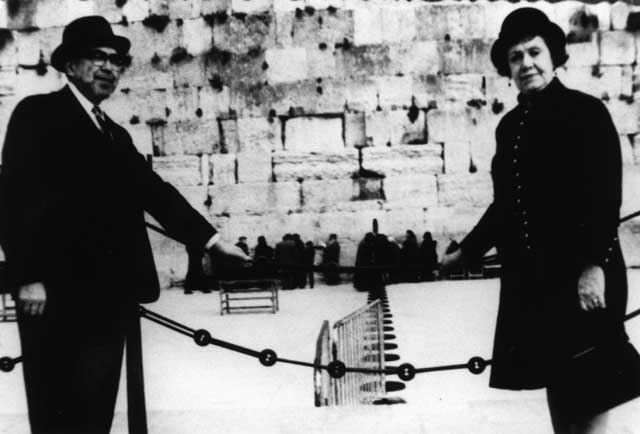 |
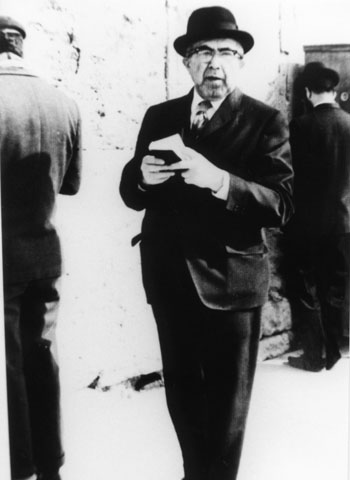 |
|
Samuel
and Nesha Korff by the Western Wall in Jerusalem during their last trip to
Israel (above) |



[1] [2] [3]
[4] [5] [6]
[7] [8] [9]
[10]
[1] By the 1950s Rabbi Joseph Soloveitchik, was considered to be the leader of modern Orthodoxy. He may at one point have been appointed Chief Rabbi of Israel. Soloveitchik lived in Roxbury but never had a permanent congregation. He commuted back and forth to Yeshiva University in New York to teach advanced rabbinic students, and developed a following of thousands of devotees nationwide.
[2] According to David's wife, Harriet Korff, David's step-grandmother Etta, would lament his career choice by exclaiming, Dovid was so smart he could have been a rabbi!